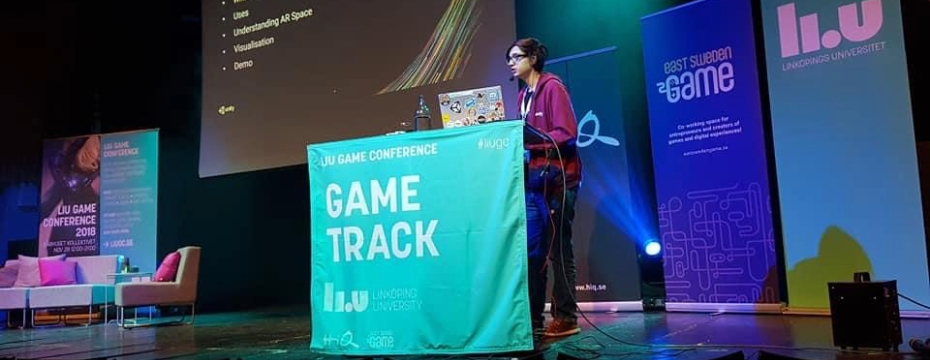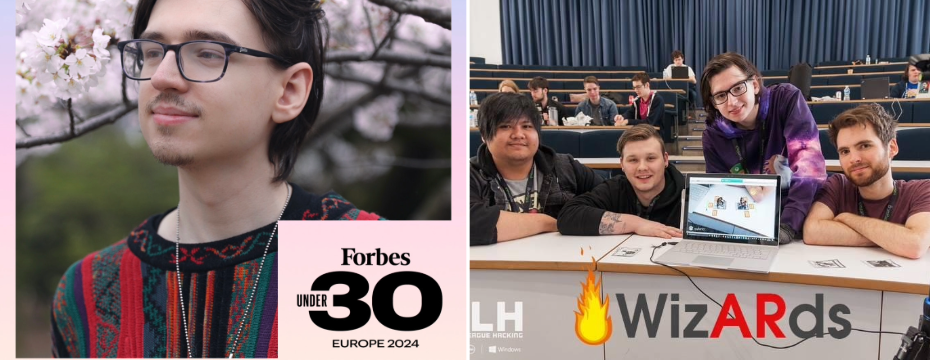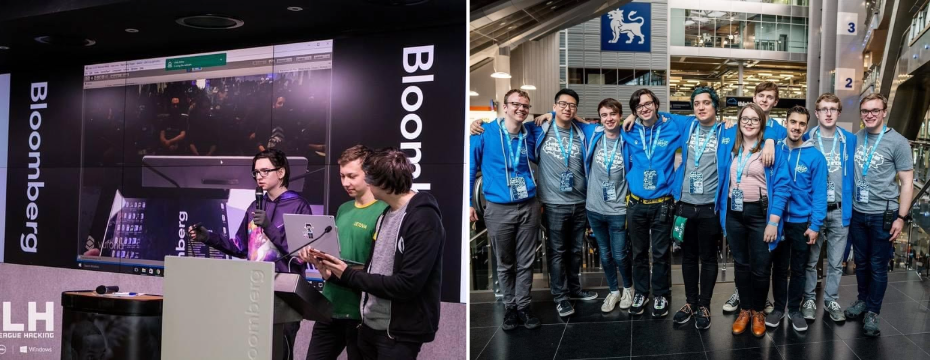University News Last updated 09 September 2024

A BCU graduate who has become a highly respected name within the video games industry has earned a spot on the prestigious Forbes 30 Under 30 list.
Liam Sorta graduated from BCU with a degree in Computer Games Technology in 2018 and is now living in Tokyo where he is building a hugely successful career.
The Forbes 30 Under 30 list is an annual international showcase of some of the most successful young entrepreneurs of our time, those who have attained recognition in contribution to their respective fields. To be recognised by Forbes is not something that can be bought or asked for, but rather it truly needs to be earned by exceptional individuals.
The news of his recognition came as a surprise to Liam, as he never believed that his career would go in this direction.
Liam said: “It’s a huge honour to make the list! I’m a firm believer that we do our best work when it’s spent doing things we are passionate about; I hope to use the opportunity to help share my journey with students and future creatives, avoiding some of the common pitfalls experienced in the games industry and entrepreneurial space.
"I set up my first company during my final year of university, creating voice applications for Alexa. it was a great way to cut my teeth on some of the challenges introduced after a project turns from a hobby release into a business. Working directly with a storefront, with agencies, lawyers, hiring, these are all areas that are typically not relevant to developers, especially starting out - which makes the urgency of ramping up quickly on these skills all the more challenging."
Liam’s first company, MagicVoice, began its humble beginnings whilst he was still studying at BCU, becoming his first significant step into the professional games industry and gaining over one million users across its applications.
Liam was soon delivering workshops to fellow students during his time at BCU, and was the youngest Subject Matter Expert in creation of the official AWS Alexa exam. The achievements earned Liam a spot as an Alexa Champion, a selective group of top developers picked by Amazon to represent the community.
The graduate understood the hurdles that many people face when entering this highly competitive industry, but through his perseverance and resilience, he found his confidence.
Liam said: “The biggest hurdle is embracing the difficulty in trying a new thing and letting that challenge be part of the excitement.
"I have always loved releasing stuff, naturally, that has led me to create a few cool projects, a few of which were able to generate income; there is also an ocean of terrible projects that went nowhere, though each project is a learning experience that improves the next project”.
In 2021, Liam joined a close friend in releasing a small game called ‘Draw & Guess’, which began as a hobby but quickly became very successful with over four million players.
Liam said: “I joined initially to help manage the development of a mobile port of the game. We then ended up spending over two years completely revamping the game into a more polished version with playable characters and more features for players.”
His understanding of game development, as well as players expectations, meant that he was able to provide direct support with crucial stages of development.
Liam’s various projects have garnered him some major industry recognition, but it was his commitment to the players and his experience as a player himself that solidified his reputation. He was able to understand the industry and apply his expertise, by listening to the community and trusting his instincts. He knew that interactive or collaborative features within games help to further engagement and drive participation.

Liam said: “Draw & Guess is our most popular game, which allows 1-16 players to take part in various drawing-related game modes. Our most popular mode, Whisper, is based on Chinese Whispers, where a single word is given to you to draw, and you need to try and keep it the same throughout the round as other players take turns drawing and guessing.
“The rise of the game was purely organic; the nature of the game makes it very easy to understand visually without context of how the game works, making it perfect for content creation on YouTube and TikTok, especially when things go wrong.”
As well as his game projects, Liam has also created Game Dev Network (GDN), to help and support independent game designers and programmers around the world.
He said: “I set up GDN back in February 2017 during the evenings of my placement year as a means of bringing game developers together to learn, share tips and feedback with each other along the way. A year later, we had already run six game jams and grown our community into the thousands.”
This was Liam’s first step in becoming an industry leader. He said: “Today we are at over 50,000 developers from all around the world and growing; we’ve been able to see people enter as complete beginners and are now seeing them enter AAA studios. Communities are an incredibly powerful force multiplier. By surrounding yourself with passionate people, your ability to make awesome stuff becomes so much easier.”
Throughout his journey in the games industry, Liam has experienced many pivotal that helped shape his journey.
Liam said: “A stand-out moment for me was being accepted into the Riot Games hackathon; having been a victim of playing far too much of League of Legends, the idea of combining my love of hackathons with one of my favourite games sounded too good not to apply.”
'Hackathon’ is an event where software engineers or programmers work towards an objective, often collaborating with industry veterans and is considered a key networking opportunity to anyone within the industry.
Liam said: “I was accepted, partly because of being a hackathon organiser myself for an event I co-founded with my friend Tom Goodman called ‘HackTheMidlands’ that we ran in Millennium Point for seven years, becoming the largest hackathons in the midlands. As part of the Riot Hackathon, I was flown out to their head studio in LA where my team and I spent a few days building an eSports VR viewing app to watch live games take place within the in-game world.”
There, he was able to truly dive into his passion with like-minded and ambitious individuals, which allowed him to gain deeper insights into the industry at one of the world’s top game studios.
Liam said: “The team I met there along with the other attendees were all truly brilliant creative developers, some of the most passionate people I’ve ever met. I was even able to meet Jeff Kaplan whilst at their offices, who was always an industry hero of mine, being able to meet him in person was such a cool experience.”

With all his successes, Liam did not realise he would become such a big name within his chosen industry, or that he would be recognised by Forbes.
Liam said: “I only decided to study Game Development instead of Filmmaking on a coin flip. I’ve taken so many risks at every point of my career, but the most exciting things happen when you push yourself just a bit further than where you’re comfortable being.
“After my first year at BCU, I applied and was accepted to a scholarship at Hanyang University in South Korea. I’d never even solo travelled outside of the UK before, so it was totally out of character for me, but easily one of the most memorable moments of my life.”
“Luck played a huge part in my journey. Every risk you take is a dice roll; the more dice you roll, the more opportunities for luck you create for yourself. I failed many times on my solo projects, was rejected from every game studio I applied to for my placement year and struggled with motivation issues after setbacks. But I kept attending events, over 30 different hackathons and game jams while I was a student, with each one teaching me something new/meeting more awesome people.”
“I’ve had the pleasure of being able to work at Unity and Amazon, given talks on stage to hundreds of people, I’ve built and sold a start-up, cofounded my second start-up with my close friend, and have been able to build a 'gamedev' community that to this day I get messages from with members saying how much impact the support we’ve given has had on their personal lives/careers.”
“I want to continue building great things with great people and to help rise up more developers, helping them get to a position where they actually build the things they want to make.”
Liam also wants to offer guidance to likeminded individuals who may be considering game development, as he understands the industry and what it means to start from the bottom, and he wants to motivate others by sharing his insights and experience.
The graduate has come a long way, but he has not forgotten his early humble beginnings during his student days at BCU, a place that opened the doors to his career in games development.
Liam said: “When I was at BCU, I was so impressed by the student work that was showcased, and throughout my time there met so many wonderful and passionate members of staff: special shout-out to Jan Krasniewicz, Carlo Harvey, and Nathan Dewell!”
Liam knows how difficult it can be to pursue an industry in games development, so he was keen to share advice with those following in his footsteps.
Liam said: “Find communities, build a TON of stuff, and learn how to get better at the things you love.
“Don’t compare your work to others as a metric of success; compare your work now to your work three, six, even nine, months ago.
“You can improve on any area of your skillset that you want, and the resources to do that to a high level are likely available for free: the more passionate you are about a subject. the more effortless the process will be.”